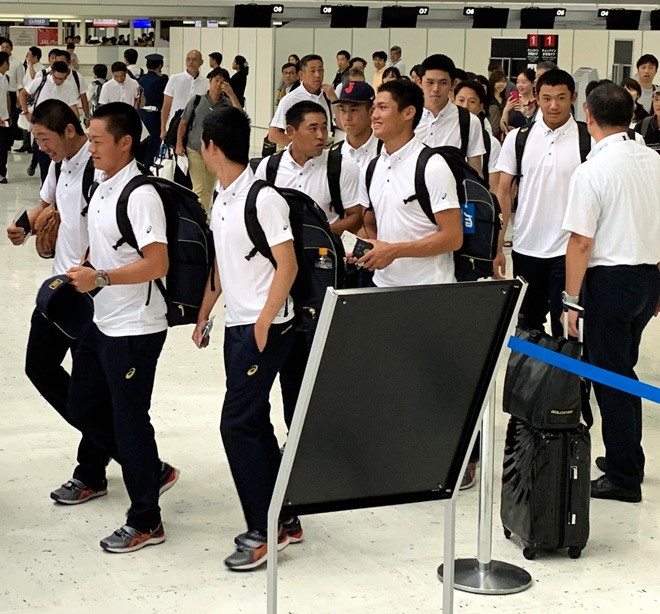Baseball team hides references to Japan on trip to South Korea

The Asahi Shimbun, August 29, 2019: To ensure the players’ safety, Japan’s under-18 baseball team traveled to South Korea without the Hinomaru national flag or the word “Japan” on their clothes, an unprecedented move described as “ridiculous” by some commentators.
Amid intensifying friction between Tokyo and Seoul, the national team on Aug. 28 left Narita Airport for Gijang, South Korea, to compete in the 29th U-18 Baseball World Cup. The players and staff members wore plain white polo shirts that gave no indication that they are representing Japan.
Masahiko Takenaka, secretary-general of the Japan High School Baseball Federation, said he has been asking the Foreign Ministry about the atmosphere in South Korea following arguments over trade, security and history issues between the two countries.
“Sports and politics are different, but we should be as cautious as possible,” Takenaka said.
He explained the decision was based on the judgment that the players’ top priority should be concentrating on their play.
During their games, they will wear uniforms that carry the Hinomaru flag and the name of their country.
The World Baseball Softball Confederation, the main host of the U-18 World Cup, told the Japanese federation that it would guarantee the safety of the players.
Takenaka, however, still advised team members to stay in groups, like the previous national team did, while they are in South Korea.
The players’ travel clothes were criticized on social media, with some posters saying it was an “excessive response” to the row at the government level.
Masayuki Tamaki, a commentator on sports culture, said the decision on the clothing was “ridiculous.”
“Hiding the fact that they are national representatives seems to tell them that they do not need pride as a national team members,” he said. “Sports can create the ultimate environment for anti-war and peace movements, and can improve worsening relations between two countries. This decision seems to give up that chance.”
On the other hand, Kan Kimura, a Kobe University professor who specializes in studies of the Korean Peninsula, said the team was right to err on the side of caution.
“As we do not have great confidence in the students’ safety, even this decision can be justified,” Kimura said. “In Seoul, there is a movement to exclude the Hinomaru from displays with other national flags.”
He also said that he can understand why people are getting sensitive about the clothing issue, and added that communication is necessary to separate politics and sports.
According to the Tokyo-based Japan Sport Association, which oversees sports organizations in Japan, polo shirts with “Japan” and the Hinomaru on the chest and back are provided to elementary, junior and senior high school students when they are sent abroad for athletic competitions.
In early August, elementary and junior high school students played in friendship matches of soccer and table tennis in South Korea. They wore the traditional shirts that showed they were representing Japan.



